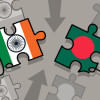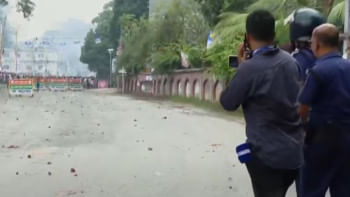PM's visit to India: Modi failed to walk the extra mile

Bangladesh-India relations are not only multifaceted but also very complex. Currently, political understanding between Prime Minister Sheikh Hasina and Prime Minister Narendra Modi at the personal level is, indeed, positive. But beneath this optimistic political façade there exists distrust due to two unwholesome realities — the RSS-rooted BJP's 'Hindutva' and a latent antipathy towards Bangladesh at the bureaucratic level.
Statements from senior BJP leaders regarding Bangladesh in the recent past were anything but friendly. Add to this the enduring perception in the South Block (Ministry of External Affairs) that the small neighbouring Muslim majority Bangladesh is a source of security threats and cannot be wholly trusted. Bangladesh is also a politically divided country, with neither a credible opposition nor any serious debates in parliament. Despite its large majority in parliament the government is basically weak. Bangladesh is, on the other hand, a rapidly growing economy making it a lucrative market and profitable investment destination for the Indian business community.
Given India's hostility towards Pakistan and strained relations with Nepal, there are good reasons for India to cultivate friendship with Bangladesh. But Delhi's procrastination in solving bilateral issues lies in Bangladesh's weakness.
It is in this backdrop that the just concluded 4-day visit (April 7-10) of Prime Minister Sheikh Hasina to Delhi has to be viewed. A lot of excitement, emotion and expectation surrounded the visit, as usual, particularly in Bangladesh.
Let's focus on two issues that dominated the discourse both in Bangladesh and India. The first is the Teesta water sharing treaty and second are the Memorandums of Understanding (MoUs) on defence cooperation.
Hasina returned with 22 MoUs — legally non-binding loose instruments — signed on different issues. MoUs can eventually lead to legally binding agreements. The 62-paragraph joint-statement also defined the trajectory in which relations are to progress in future.
The Prime Minister's press briefing contained more political rhetoric than actual achievements. A careful look at the list of MoUs shows that many of these documents could have been signed at functional levels rather than be brought up at the summit level. This was presumably done to give the media something to talk about.
The Teesta treaty has been high on Bangladesh's agenda for the past 20 years, but with no signs of any solution. Hasina is now caught between the petty vote politics of BJP and TMC over the forthcoming West Bengal elections. The Indian constitution empowers Modi to overrule Mamata Banerjee and sign the treaty. Letting Sheikh Hasina negotiate with Mamata was an unprecedented move. It was Modi's job to settle the issue with Mamata and deliver it to Hasina. Delhi will now use this precedent every time issues related to states bordering Bangladesh come up.
What was most outlandish is that Mamata Banerjee, going back on her words to Sheikh Hasina "to keep faith in her and to not worry", told her that there was no water in Teesta to share with Bangladesh. Surprisingly, the joint statement does not mention anything about the Joint Rivers Commission, which was supposed to sort out all the sticky issues related to the treaty. The JRC has not met after 2010 and is presumably dead. Prime Minister Modi, however, assured an early settlement of the treaty.
It took 24 years to get the Ganges Water Sharing Treaty signed (1996). That too is not being respected by India — Bangladesh does not get her share of water from the Farakka barrage. One wonders, after all the hullaballoo, will Bangladesh get its share of water from Teesta even if the treaty is signed?
On the defence front, India wanted to sign a long-term (25-year) comprehensive defence cooperation agreement. This was mooted by the Indian Defence Minister Manohar Parrikar when he rushed to Dhaka in November 2016, soon after Bangladesh acquired two submarines from China. Clearly the proposal was driven by India's anti-China policy. Bangladesh needs to maintain equal partnerships with India and China. Bangladesh cannot afford to be drawn into great power rivalries in Asia, or elsewhere.
The signing of the 4 MoUs will remain a source of concern until full details of the "Defence Cooperation Framework" are known. On the USD 500 million line of credit, PM Hasina, in her press briefing on April 11, said that Bangladesh will decide what kinds of equipment will be procured from India. The point here is that India is heavily dependent on imports from various sources, as it does not produce high quality military hardware. Only last week, India signed a USD 2 billion agreement with Israel for weapons technology and procurement of military equipment.
The other concern relates to the meaning of the MoU on "cooperation in the field of strategic and operational studies". Defence force of every nation develops top secret strategies and operational plans to defend its sovereignty. Bangladesh's defence establishments must also have such blueprints. One hopes that Bangladesh will not be required to share these secret policy documents with India.
Bangladesh has walked the extra mile and addressed all of India's security and connectivity concerns. Hasina, this time, went even further to honour Indian soldiers who died fighting in Bangladesh's Liberation War. Despite all the upbeat rhetoric from Narendra Modi, the fact remains, Sheikh Hasina came back with promises only. However, Bangladesh can probably take comfort in the fact that PM Hasina was accorded head of state protocol by the Indian government. Cynics may say, by being extra nice, Modi had tried to make up for the botched Teesta deal.
One expected Modi to be sensitive towards the needs of its neighbour and walk the extra mile for Bangladesh. It seems that the element of distrust still exists, as BJP leaders are unable to translate their supposed goodwill into action because of the 'Hindutva' ideology and the lagging bureaucracy — examples: border killings, massive trade imbalance, violating the Ganges treaty, no initiative in water sharing of common rivers, etc.
The writer is former Ambassador and Secretary.

 For all latest news, follow The Daily Star's Google News channel.
For all latest news, follow The Daily Star's Google News channel. 








Comments